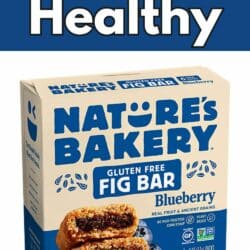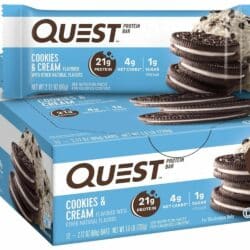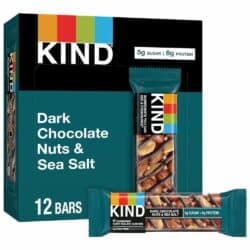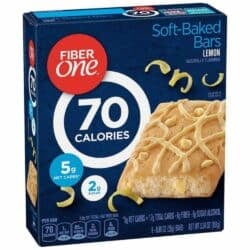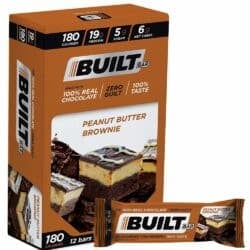Are Fig Bars Healthy (From a Nutritionist)?
In this blog post, I’ll review the question of whether Fig Bars are healthy or not. Find out this product’s nutrition pros and cons and some better options you can consider. My opinion as a nutritionist is that this is a decent snack choice with several grams of fiber per serving, although the ingredient does contain added sugar and several processed ingredients.
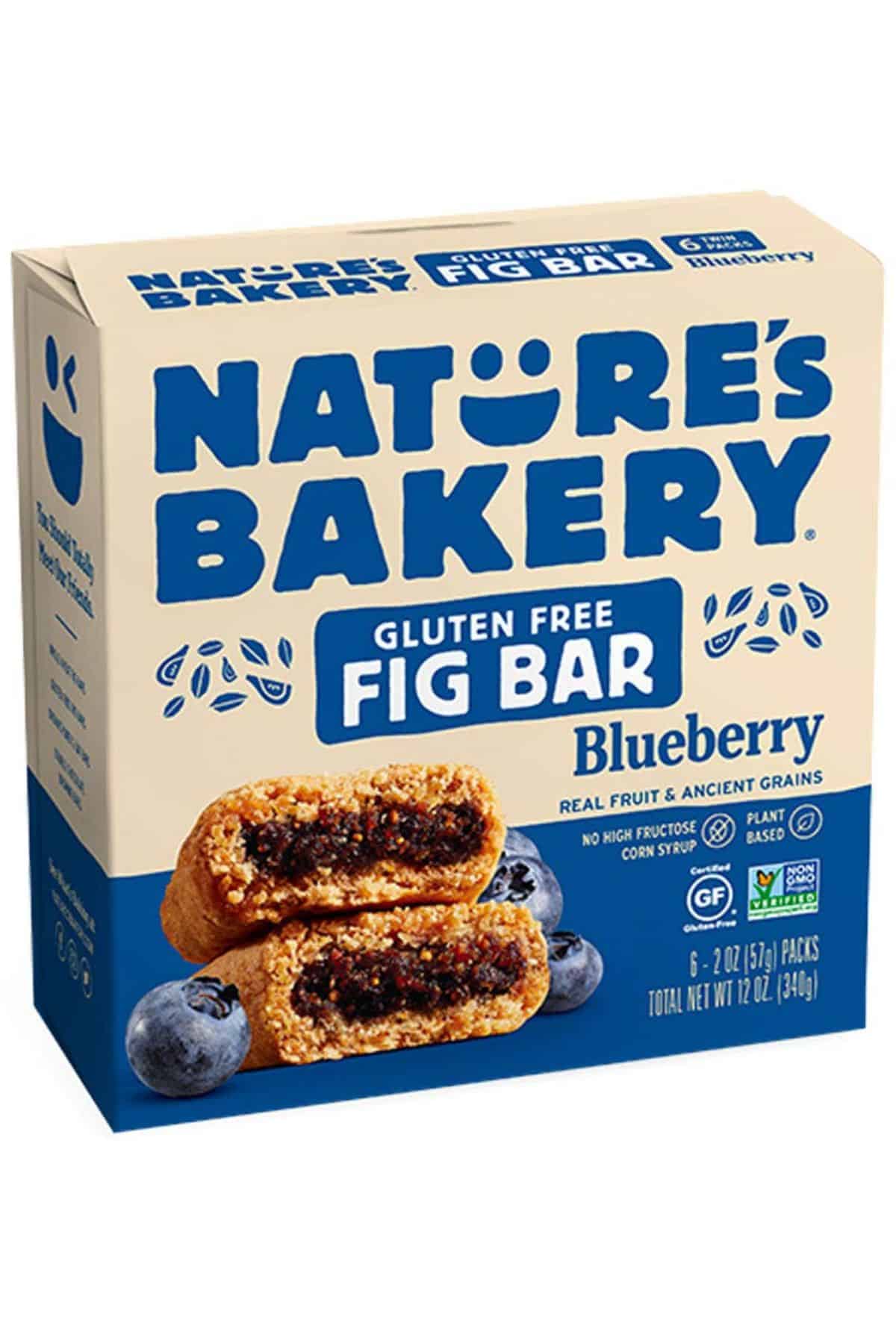
Fig Bar Facts
Nature’s Bakery Fig Bars are snack bars marketed as an excellent choice for active families who want wholesome snack food that is both convenient and nutritional.
In 2010, Dave Marson and his son Sam Marson founded Nature’s Bakery in Reno, Nevada. In 2020, KIND, a Mars family of companies, purchased the Nature’s Bakery brand. Today, Nature’s Bakery produces Fig Bars, a few other snack bar options, and a line of gluten-free fig bars.
Nature’s Bakery Fig Bars are available in various flavors and contain ingredients like whole wheat flour, cane sugar, fig paste, natural flavor, and whole grain oats.
The bars are plant-based, non-GMO, nut-free, and contain no high fructose corn syrup. However, they have 14g to 16g of added sugar, and the gluten-free Fig Bars have 11g to 12g of added sugar.
The bars are available in the following flavors:
Regular:
- Apple Cinnamon
- Pumpkin Spice
- Strawberry
- Original Fig
- Peach Apricot
Regular or gluten-free:
- Blueberry
- Raspberry
Gluten-free only:
- Pomegranate
Each of these flavor variations has different ingredient combinations.
According to the nutrition label, each serving of the regular Fig Bar contains 200 calories, 3g of protein, 3g to 4g of fiber, and no high-fructose corn syrup.
The Gluten-Free Fig Bars contain 200-210 calories, 2 g of protein, 3 g of fiber, and no high-fructose corn syrup.
Fig Bar Ingredients
Nature’s Baker Fig Bars ingredients include brown rice syrup, cane sugar, fig paste, sea salt, citric acid, whole grain oats, and natural flavor.
The regular bars contain whole wheat flour, while the gluten-free options contain a gluten-free five-grain blend of amaranth, quinoa, millet, sorghum, and teff.
Different flavors have variations in their ingredient lists and some differences in nutritional profiles. The bars contain added sugars like cane sugar, brown rice syrup, and fig paste for added flavor and sweetness.
Let’s take a closer look at some of the ingredients in Nature’s Bakery Fig Bars and what they might mean for your health.
The ingredient list for Nature’s Bakery Blueberry Fig Bars is as follows:
- Whole Wheat Flour
- Cane Sugar
- Fig Paste
- Brown Rice Syrup
- Blueberry Jam (Cane Sugar, Naturally Milled Sugar, Rice Starch, Glycerin, Blueberries, Apple Powder, Natural Flavors, Pectin, Citric Acid, Locust Bean Gum)
- Canola Oil
- Whole Grain Oats
- Glycerin
- Fruit Juice (for color)
- Sea Salt
- Natural Flavor
- Citric Acid
- Baking Soda
Natural Flavors
When it comes to the term “natural flavor,” there is a lot of conflicting information about what that term means in food labeling. Because there is no actual definition for that term, food manufacturing companies can use it to describe nearly any food product, additive, or ingredient.
It’s worth noting that some so-called “natural flavors” are produced using artificial derivatives and processes, such as enzyme-assisted extraction. These types of processing may use high heat and solvents to extract the flavor.
Unless the food manufacturing company reveals its production methods for “natural flavor,” it’s difficult to know whether they have any nutritional value or are considered healthy.
Whole Wheat Flour
Nature’s Bakery Fig Bars contain whole wheat flour as a main ingredient. This flour is a fine powder created from milling wheat.
Whole wheat flour contains parts of the natural kernel, including bran, endosperm, and germ. This type of flour typically has a shorter shelf life than white flour because of the oil and germ contents in the bran.
Wheat is a known allergen, and people sensitive to wheat and gluten should avoid these foods. People who have celiac disease are at risk of developing several severe health conditions, including malnourishment, chronic anemia, osteoporosis, and the potential for developing certain types of cancer.
Nature’s Bakery offers a line of gluten-free fig bars for people with gluten intolerance or allergy to whole grains like wheat.
Canola Oil
Nature’s Bakery Fig Bars contain canola oil, a seed oil. Research shows that seed oils like canola can cause chronic inflammation.
These oils are highly processed, and most are hydrogenated to extend the oil’s shelf life.
Hydrogenation increases trans fat levels, which may raise bad cholesterol (LDL) and cause health problems. Along with the hydrogenation process, some food manufacturers extract the seed oil using toxic solvents and high temperatures. These processes may contaminate the final product.
Cane Sugar
Granulated sugar can be made from sugar beets and sugar cane, but cane sugar is exclusively made from sugar cane. Although less processed than granulated sugar, cane sugar is still processed.
Eating cane sugar in moderation has some health benefits, like providing energy and antioxidants. However, consuming cane sugar can create several potentially harmful effects on a person’s health, including heart disease, weight gain, diabetes, dental cavities, and much more.
Fig Paste
Fig paste is a fruit puree made with figs to enhance a product’s flavor or sweetness. Since the figs are processed, their nutritional content may be affected negatively.
The company’s website doesn’t specify whether the fig paste used is additive and preservative-free or if it contains artificial sweeteners or added sugars.
Gluten-Free Flour Blend
The gluten-free flour blend in the gluten-free variations of Nature’s Bakery Fig Bars combines the nutritional powerhouses of amaranth, quinoa, millet, sorghum, and teff.
These grains are gluten-free and contain essential nutrients.
Nutrition Pros
Nature’s Bakery Fig Bars are a convenient snack for people on a plant-based diet or who want a grab-and-go nutritious snack.
There is a gluten-free version, and all products are free of nuts, non-GMO, and dairy-free. The gluten-free options contain five grains with potential health benefits. I have personally enjoyed the gluten-free version and think it’s a healthy snack option every once in awhile.
There is no high-fructose corn syrup in any of the variations, and each bar has 3-4 grams of fiber. The ingredients list is also free from artificial flavors.
Nutrition Cons
Although Nature’s Bakery Fig Bars are convenient, they are not organic and contain anywhere between 11g to 16g of added sugar and some potentially unhealthy ingredients.
If you’re avoiding sugar or seed oils in your diet, it is best to avoid this snack bar and try to stick with just natural ingredients or homemade fig newtons using fresh figs and a food processor (this gluten-free recipe using almond flour looks great).
The regular, not gluten-free, bars are made with whole wheat flour, a known allergen, and all bars contain canola oil with associated health risks.
Nutrition FAQs
Nature’s Bakery products are nut-free, and they promote their snacks as safe to take to school. However, the regular bars contain wheat, an allergen and unsuitable for kids who are sensitive or allergic to gluten.
Nature’s Baker Fig Bars also contain added sugar and seed oil – both ingredients health-conscious parents may want to avoid for their kids or only allow in moderation. Fresh fruit or carrot sticks make excellent snacks for kids. See my full list of the best gluten-free and dairy-free snacks.
No, Nature’s Bakery Fig Bars do not contain any unnatural preservatives. However, citric acid is a natural preservative; the bars contain this ingredient.
No, Nature’s Bakery Fig Bars are not organic. They are non-GMO.
Try These Healthy Snack Options
Conclusions
Nature’s Bakery Fig Bars contain some healthy food ingredients and are more nutritious than most regular candy bars. The gluten-free variations contain a blend of five grains with significant health properties.
However, these bars have between 11g and 16g of added sugar, which can be more sugar than some regular candy bar brands. Nature’s Bakery Fig Bars also contain canola oil which is an industrial seed oil and not considered part of a clean eating approach.
More Snack Bar Reviews You Might Like
Don’t forget to join my newsletter list to get exclusive clean eating recipes and tips. The newsletter is 100% free with no spam; unsubscribe anytime.
About the Author: Carrie Forrest has a master’s degree in public health with a specialty in nutrition and is a certified holistic nutritionist. She is a top wellness and food blogger with over 5 million annual visitors to her site. Carrie has an incredible story of recovery from chronic illness and is passionate about helping other women transform their health. Send her a message through her contact form.
Note: this post is for informational purposes only and is not intended as medical advice. Please consult your healthcare provider for recommendations related to your individual situation.


